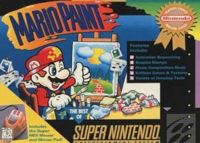Difference between revisions of "Mario Paint"
m |
|||
| Line 9: | Line 9: | ||
| release=US May 5, 1992<br />JP July 14, 1992<br />EU December 10, 1992 | | release=US May 5, 1992<br />JP July 14, 1992<br />EU December 10, 1992 | ||
| gallery=[http://www.gamehiker.com/gallery/index.php?cat=97 GH Gallery] | | gallery=[http://www.gamehiker.com/gallery/index.php?cat=97 GH Gallery] | ||
| − | | rating= | + | | rating= |
|}} | |}} | ||
Revision as of 14:18, 25 March 2007

| |
| Mario Paint | |
| Developer | Nintendo EAD |
| Publisher | Nintendo |
| System | Super Nintendo |
| Release Date | US May 5, 1992 JP July 14, 1992 EU December 10, 1992 |
| Gallery | GH Gallery |
Released for the Super Nintendo in 1992, Mario Paint was the first game to make use of the SNES mouse add-on. In fact, the game came packaged with the mouse and the mousepad.
Gameplay
The game's main mode was a drawing board where they player could make various works of art using the SNES mouse, similar to computer paint programs. There were also a variety of other modes where players could compose music or create customized stamps.
Fly Swatter
Fly Swatter was a special minigame included in the game and was more like a "real" video game than the rest of Mario Paint. In Fly Swatter, the player controlled a hand holding a flyswatter. The object of the game was to eliminate all of the onscreen insects and their giant mechanical leader, Watinga.
Legacy
Sequels
In Japan, it was followed up by the Mario Artist series of games made for the short-lived Nintendo 64 Disk Drive.
Ports/Remakes
- Fly Swatter appeared as an unlockable minigame in the 2001 Gameboy Advance game Warioware, Inc.: Mega Microgame$.